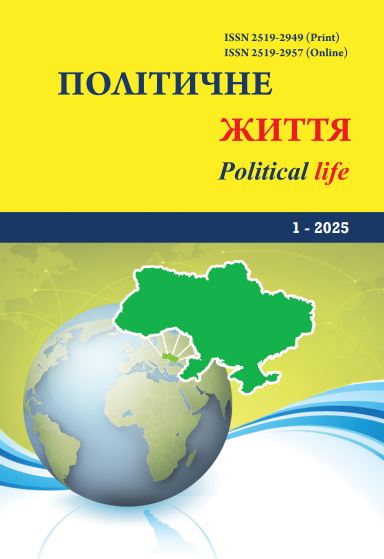The impact of sanctions policy on economic stability: an analysis of socio-political consequences
DOI:
https://doi.org/10.31558/2519-2949.2025.1.17Keywords:
sanctions policy, economic security, international sanctions, public opinionAbstract
The article examines the impact of sanctions policy on economic stability and its socio-political consequences. The author considers sanctions as a multidimensional instrument of international influence that can have both positive and negative effects on the target state. Particular attention is paid to the economic security of Ukraine in the context of Russia's military aggression and the impact of international sanctions on the national economy. The study highlights the key mechanisms of sanctions, their effectiveness and consequences for economic and political stability. The main types of sanctions - energy, financial and food sanctions - and their impact on the economic security of states are considered. The author analyzes how the sanctions policy affects the living standards of the population, unemployment and stability of the financial system. Attention is paid to the issue of economic inequality, which is increasing under the influence of sanctions, especially for vulnerable groups. The author examines the socio-political aspects of sanctions policy, in particular its impact on domestic political dynamics. The author highlights the role of sanctions in consolidating or destabilizing political regimes, depending on the specifics of the society and the level of trust in the government. Special emphasis is placed on the information component of sanctions policy. The author analyzes how the media and public opinion affect the effectiveness of sanctions and their receptivity among the population. The author emphasizes the importance of information strategies in building public support for sanctions policy. It is concluded that sanctions are a powerful instrument of international politics, but their effectiveness depends on the context of their application, the depth of economic relations and the political situation in the target country.
References
Center for Strategic and International Studies (CSS). The Role of Sanctions in.
Вакулич В., Новородовська Н. Російська пропаганда агресії проти України (2014–2021 рр.). Український інформаційний простір. 2023. № 1(11). С. 119–132. URL: https://doi.org/10.31866/2616-7948.1(11).2023.279610
Васильців Т., Лупак Р., Куницька-Іляш М., Наконечна Н. Економічна безпека суб’єктів господарювання та держави: аспект гарантування фінансово-економічної безпеки пріоритетних галузей національного господарства України. Наукові записки Львівського університету бізнесу та права. 2023. № 37. С. 22–30.
Гарькава В. Економічна безпека регіонів України. Економіка України. 2022. № 2. С. 37–49.
Горбик Р., Дуцик Д., Шалайський С. Ефективність протидії російській дезінформації в Україні в умовах повномасштабної війни. Аналітичний звіт. ГО «Український інститут медіа та комунікації», 2023 66 с.
Громовенко К. В. Економічні санкції: міжнародно-правові аспекти ефективності. Знання європейського права. 2021. № 4. С. 70–77. URL: https://doi.org/10.32837/chern.v0i4.265 (дата звернення: 05.02.2025
Коваль Д., Бернацький Б. Санкційний довідник: уроки для України з практики іноземного санкційного законодавства та міжнародного права. Центр прав людини ZMINA. Київ, 2023. 96 с
Міжнародні санкції як інструмент стримування російської агресії проти України : аналіт. доп. за заг. ред. М. Паламарчука. Київ : НІСД, 2023. 76 с. (Серія «Міжнародні відносини»). DOI: https://doi.org/10.53679/NISSanalytrep.2023.10
Москвін Б. Економічна безпека фінансових інституцій в умовах воєнного стану в Україні. Економіка і організація управління. 2022. № 2(46). С. 110–119.
Правдивець О. Економічна безпека, як найвища функція держави. Вчені записки Університету «КРОК». 2022. № 2(66). С. 40–43.
Саричев В., Гапєєва О., Бикова А. Аналіз ефективності економічної політики України щодо забезпечення економічної безпеки: проблеми та перспективи. Наукові інновації та передові технології. 2023. № 14(28). URL: https://doi.org/10.52058/2786-5274-2023-14(28)-780-795.

